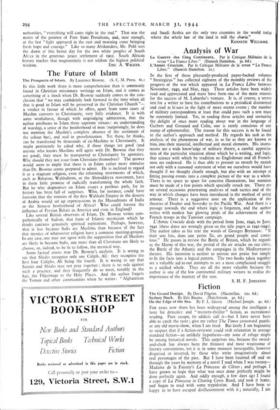The Future of Islam
The Prospects of Islam. By Laurence Browne. (S. C. M. Press. 6s.) IN this little work there is more comprehension than is commonly found in Christian missionary writings on Islam, and it comes as something of a shock when Dr. Browne suddenly comes to the con- clusion that "we may confidently look forward to the time when all that is good in Islam will be preserved in the Christian Church "- a verdict in favour of which he offers, apart from some cases of Muslim converts to Christianity, very little evidence. It is with some wistfulness, though with ungrudging admiration, that the author attributes to Islam three supreme virtues: an. understanding of worship, a sense of the brotherhood of man (surprisingly, he does not mention the Muslim's complete absence of the sentiment of the colour bar), and zeal in proselytisation. Yet these, he thinks, can be transferred by thousands of ex-Muslims to Christianity. It might pertinently be asked why, if these things are good (and anyone who knows Muslims will agree with Dr. Browne that they are good), they must be transported to Christianity by apostates. Why should they not issue from Christians themselves? The answer would seem to imply that there is in Islam rather more stimulus than Dr. Browne seems prepared to admit. He is inclined to regard it as a stagnant religion, even the reforming movements of which, such as Bahaism, Wahhabism, or the Ahmaddiyya movement, have in them little promise of radically transforming the whole faith. But he who dogmatises on Islam essays a perilous path, for its history has been full of surprises. Who, for instance, could have foreseen that the votaries of the first Wahhabi Empire in the deserts of Arabia would set up repercussions in the Mussulmans of India or the Senussi brotherhood of Africa? Who could foresee the influence of Persian Bahais in America and even in England?
Like several British observers of Islam, Dr. Browne writes sym- pathetically of Sufism, that form of Islamic mysticism which he thinks contains genuinely spiritual aspirations. Perhaps, however, that is less because Sufis are Muslims than because of the fact that mystics of whatsoever religion have a common meeting-ground. In any case, one may not agree with the supposition that all Muslims are likely to become Sufis, any more than all Christians are likely to choose, or, indeed, to be fit to follow, the mystical way.
Some factual errors mar Dr. Browne's analysis. It is wrong to say that Shiahs recognise only one Caliph, Ali: they recognise the first four Caliphs, Ali being the fourth. It is wrong to say that Sunnis and Shiahs may not pray together ; there is no rule against such a practice, and they frequently do so meet, notably in the hail, the Pilgrimage to the Holy Places. And the author forgets the Yemen and other communities when he writes: "Afghanistan and Saudi Arabia are the only two countries in the world today where the whole law of the land is still the shoria."
KENNETH WILLIAMS.






















 Previous page
Previous page